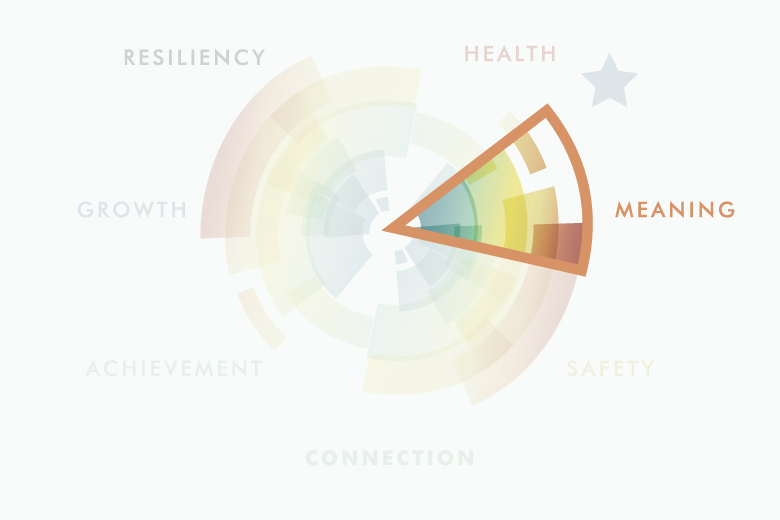It should come as no surprise that the spaces we occupy every day have a huge impact on our overall wellness. The Environmental Protection Agency and Vancouver Coastal Health report that Americans and Canadians spend about 90% of their time indoors. But what about the time we spend outdoors?
Your Welcoa membership has expired.
What is the Meaning of All of This? Strategies for More Purpose at Work
MEANING: Feeling part of something bigger than yourself. Knowing that your work matters. Having purpose in your life.
Why is MEANING critical to making the workplace whole again?
For WELCOA, the construct of meaning and purpose has been central to our evolution of wellness. We have been hosting experts and conversations on the topic since 2015 and launched certification courses on the WELCOA Institute to help our Members incorporate the concept of purpose into their wellness strategies. The reason? The evidence is compelling. Author and lecturer on purpose in psychology, Steven Taylor, said “The need for purpose is one the defining characteristics of human beings. Human beings crave purpose and suffer serious psychological difficulties when we don’t have it. Purpose is a fundamental component of a fulfilling life.”
For me personally, purpose is the reason why I chose worksite wellness as a career. I watched as work tragically stripped purpose from the people closest to me as a child. The result was that I was terrified of the idea of work. I thought work stripped humans of their souls. I wanted to invest my energy and time into hopefully changing all of that. In a 2016 blog post, I challenged readers that they had the right to work within their strengths in a way that connected them with a true calling. I shared that my worst days at work are when I feel like my work is not contributing to the purpose with which I entered into this industry in the first place. I say all this not because I think I am in any way special—quite the contrary. The evidence around purpose and meaning tells us that connecting with purpose is fuel for performance at work and in life no matter who you are.
How does fostering MEANING affect the working human?
In 2015, I read a study that stopped me in my tracks. Researchers in Michigan1 wanted to study the impact that connecting students with their eudaimonic values—or sense of purpose—had on health behaviors. They basically told some students that they were not chosen to work on a special project (they hurt some students’ feelings) then asked them to do one of three things: journal about their daily task list, journal about their self-enhancing goals for their lives, or journal about their deeper purpose. Then, they asked them to taste-test cookies. The dependent variable was number of cookies, stress-eaten. You cannot make this stuff up. They found that, on average, students who journaled about their task list ate more than eight cookies, while those who journaled about their goals ate a little more than four. Incredibly, students who were reminded of their core purpose ate fewer cookies than anyone else: just under three on average. I remember thinking to myself that the wellness industry could not ignore this kind of link between our purpose and our compulsions and choices when it came to health behaviors. I was also struck with how often we do the opposite in wellness—telling our employees what they are doing wrong when it comes to their health instead of reminding them what they can achieve for themselves personally by making a different choice. We, at WELCOA, became obsessive with the “why” behind the human.
What are the first steps to improving MEANING in the workplace?
How do you help employees tap into a sense of meaning and purpose at work? An important first step is assessing the core values of your employees. Construction company Skanska surveyed their employees and found that, overwhelmingly, family was a core value. They restructured their safety program around the family, hosting family safety days, sending safety policies home to spouses for review, etc. They even put photos of workers’ families on their hard hats to remind them why they were choosing important safety behaviors. As a result, they decreased accidents by 50% across a three-year timeframe.
At the most basic level though, it is important that employees are working in their strengths. Strong relationships with managers that allow for candid conversations about this are important. Consider training leadership on the value of connecting employees with purposeful and meaningful work. Now more than ever, connecting with what is truly important to us as humans is critical to the well-being and performance for ourselves and our organizations.
How is WELCOA implementing strategies for MEANING in our organization?
One of the things that we are most proud of at WELCOA is our increased efforts to show everyone on the team what role they play in the success of our organization. For a small, resilient organization like WELCOA, often times work roles have gotten blurred. We are an all-hands-on-deck kind of culture. In recent years, to help employees see specifically the ways that their work matters, we created an organization-wide set of objectives with key results and assigned champions (leads) for each major result that would help us achieve our vision. This might feel more like a planning initiative and less like a wellness one, but it is crucial to helping us each remember why our work matters. In daily operations, weekly 1:1s with managers ensure everyone’s still aligned with their purpose and role. Daily all-employee meetings give everyone the opportunity to clearly communicate their focus and priorities for the week, making work contributions public and salient to all. We also provide a paid day to give to encourage team members to connect with a mission larger than themselves in their personal lives.
What are WELCOA resources that support MEANING?
- Are you obsessed with the purpose behind the work like WELCOA is? Attendees of the WELCOA Connect – Idea Collective class (August 10 – September 11) have the opportunities to connect with wellness experts on a deeper level by signing up for Connect Fireside Chats. These unique, live virtual meetings with each of the 15 Idea Collective speakers provide you with the exclusive opportunity to hear more about their journey and the passion driving the work they do. You can’t miss this networking opportunity led by Lives Radio Show host, Stuart Chittenden! Sign up here.
- WELCOA Institute Course: Reimagining Careers to Unlock Potential with the Science of Purpose
- WELCOA Institute Course: Finding Your Forte – Pursuing Purpose in Your Career, Business & Leadership
- WELCOA Institute Course: Communicating Your Wellness Strategy with Purpose & Power
- WELCOA Summit Keynote (video): The Science of Purpose with Arthur Woods
- WELCOA Summit Keynote (audio): On Purpose with Vic Strecher
1. Burson, A., Crocker, J., & Mischkowski, D. (2012). Two Types of Value-Affirmation: Implications for Self-Control Following Social Exclusion. Social Psychological and Personality Science, 3(4), 510–516. https://doi.org/10.1177/1948550611427773
To read all posts in the Definition of Wellness series, visit the below links:
- Making the Workplace Whole: Meeting Basic Human Needs
- How Better Connection Can Make the Workplace Whole
- Removing Barriers in the Workplace to Help Employees Achieve
- Why Growth Opportunities Give Employees a Reason to Show Up
- Forget Stress Management: The Future of Work Requires Resilience
- Cultivate Physical and Psychological Safety in Your Workplace
- Why Traditional Health Still Matters, But We Have to Get It Right!

Sara Martin, MS // Interim Chief Executive Officer • WELCOA
Sara has launched award-winning wellness programs and engineered work environments to create cultures of health across multiple industries. At WELCOA, her role is to ensure you continue to have access to the best products and information so you can achieve your professional and personal wellness goals.




